How to Protect Scales From Rain This Spring
While Spring brings a much needed reprieve from snow and freezing conditions, it also brings rain storms. Protecting scales from rain is much easier, and much more cost effective, than repairing damage after it has occurred. Scales that are typically used outdoors are designed to weather the elements, but there are still certain measures operators need to take to ensure their equipment is protected. Water damage can be extremely expensive, or even impossible to repair. So use these simple preventative measures to protect scales from rain this season.
Protect Scales Against Condensation
One of the most often overlooked dangers to scales is the moisture accumulation that lingers after rain storms have passed. To protect scales from rain, prevention is important, as is taking measures to ensure that any moisture that has accumulated is given the opportunity to fully dry as soon as possible. Let’s review some ways to ensure scales and components are not left vulnerable to rain after the storm has passed.
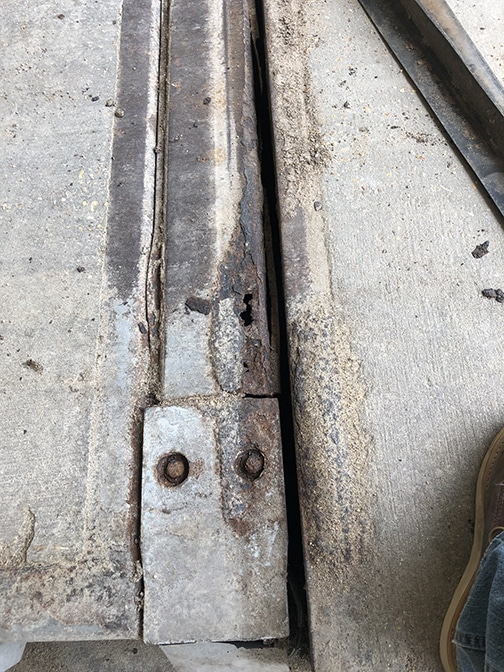
Use T-belting to protect against debris, but remember to remove the rubber & let it dry out after a storm.
T-belting is very effective at preventing debris from getting beneath the scale platform. Debris tossed around during a storm could cause major issues later if it gets trapped within the scale, so T-belting performs an important job. However, it’s important to remember to remove the T-belting after a storm to allow both the rubber belt and the steel straps on the scale deck to dry. This helps prevent rust that might be caused by allowing the condensation to remain trapped under the rubber T-belting, against the steel straps. Lastly, remember to regularly inspect & replace any worn sections to prevent damage & truly protect scales from rain. If debris or water can slip through cracks or worn spots in the rubber, the T-belting is ineffective.
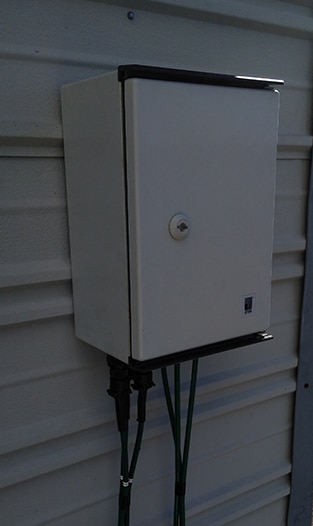
Do not use plastic sheeting to cover junction boxes or other scale components.
Occasionally, the Michelli service team has seen customers cover junction boxes & other components with plastic bags or plastic sheets in an effort to protect against rain. In reality, these type of plastic coverings can actually trap moisture inside, causing damage to the scale’s electrical components.
Weather-proof junction boxes should be used to protect scales from rain if junction boxes are located in an area where they are exposed to the elements. These boxes are meant to prevent rain from entering, and help to ensure water does not affect the scale’s operation. Regular inspections are the key to help scale operators or service technicians detect any broken gaskets or other issues that could cause leaky junction boxes.
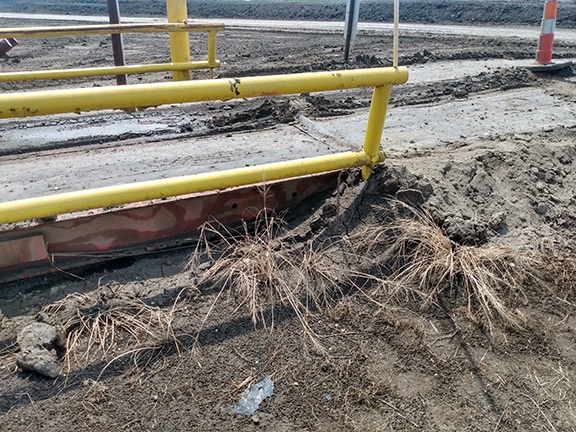
Ensure scales are installed in an area with proper drainage.
Proper scale placement during installation is the best way to protect scales from rain later. By installing the equipment in an area that facilitates proper drainage, users can protect the scale from rain by reducing the chance of water puddling over the scale or its components. Drainage underneath the scale is imperative as well. If standing water accumulates beneath the scale, it can cause condensation under the scale deck, leading to rust.
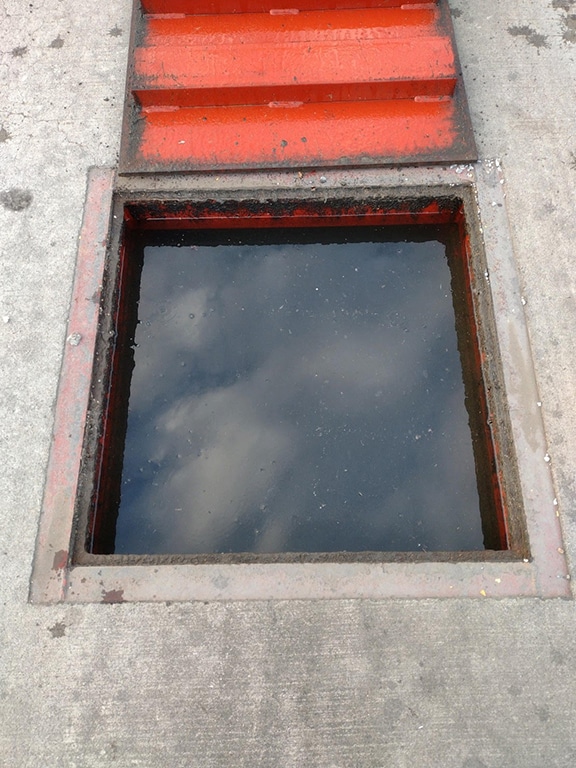
Regularly clean scale to remove any dirt and debris that has accumulated beneath it.
Properly cleaning underneath scales is necessary to remove dirt and debris buildup, which could also inhibit proper drainage. Dirt accumulation beneath a scale can affect performance and accuracy. Not to mention that a rainstorm could turn that dirt into mud, and mud accumulation causes larger problems for truck scales. Mud tends to cling to scales, and the moisture contained in the mud can slowly corrode a scale and cause deterioration.
Occasionally, the only available place for a scale to be installed is in an area with less than optimal drainage conditions. Alternatively, conditions surrounding a scale could deteriorate over the years, leading to poor drainage conditions. In either case, there are some steps scale operators can take to minimize damage and protect scales from rain.
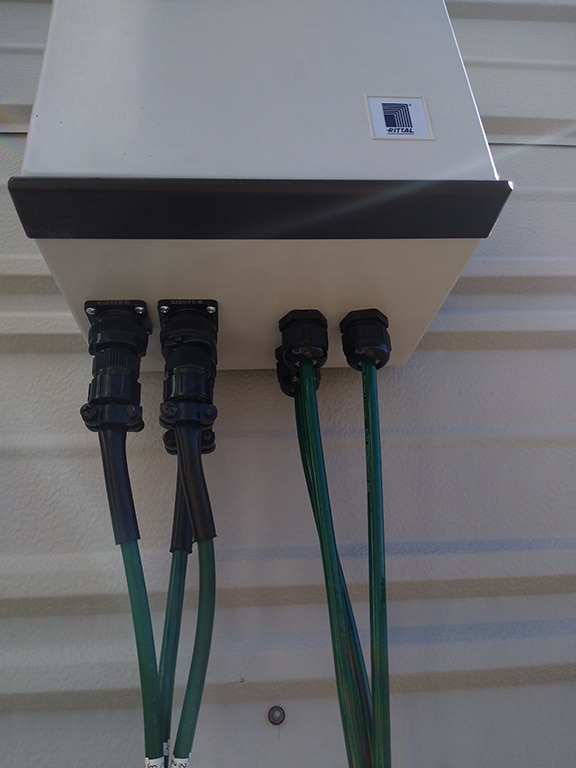
Consider “quick connect” set ups for scales in areas with bad drainage.
If your scale has to be in an area with bad drainage, consider a “quick connect” set up. “Quick connects” provide a place for users to screw cables into the junction box. These cables are easily removable. The ability to quickly disconnect cables allows operators to unscrew the connectors to free scale cables in an effort to prevent water damage or even move the scale somewhat easily if needed.
Install and maintain sump pumps to remove standing water if necessary.
Sump pumps provide a great solution to help remove standing water from scales located in areas with bad drainage. These pumps can help protect scales from rain and save the day by removing puddled water relatively quickly. However, it’s important to remember to regularly inspect, service and test sump pumps. Our service team often finds pumps have malfunctioned due to lack of maintenance, causing water to build up which could flood junction boxes and damage the scale. Here are some steps you can take to make sure sump pumps remain in good working order, so they are ready to go when you need to use them.
-
- Sump pump area needs to be cleaned out routinely.
- Sump pump lines(hoses) need to be checked for cracks and or disconnection/connection.
- Sump pump electrical needs to be tested routinely ( the power source 120VAC and the float on the pump).
- Sump pump itself needs to be tested for functionality.
Using these simple tips can make a huge difference and help to protect scales from rain this Spring. The important thing to remember is that prevention is almost always more cost effective than repair. Lastly, scale decks can get pretty slippery from dew and condensation. Please be sure to take extra care when performing maintenance of any kind, especially when the equipment may be wet.
Interested in other ways to protect your scales, increase productivity & minimize downtime? Check out these other blog posts:
Tips to Help You Increase Productivity & Minimize Downtime
Winter maintenance for your scales & measurement equipment
Need Help With Preventative Maintenance?
We often hear from customers that they don’t have the time or the manpower to perform preventative maintenance correctly. Let us help. Michelli Weighing & Measurement offers preventative maintenance plans that help our customers keep equipment in top working order without any hassle. Plus, customers with preventative maintenance service agreements lock in service rates, enjoy “set it and forget it” style maintenance and discounts on replacement parts. Contact your nearest location today to learn more.
